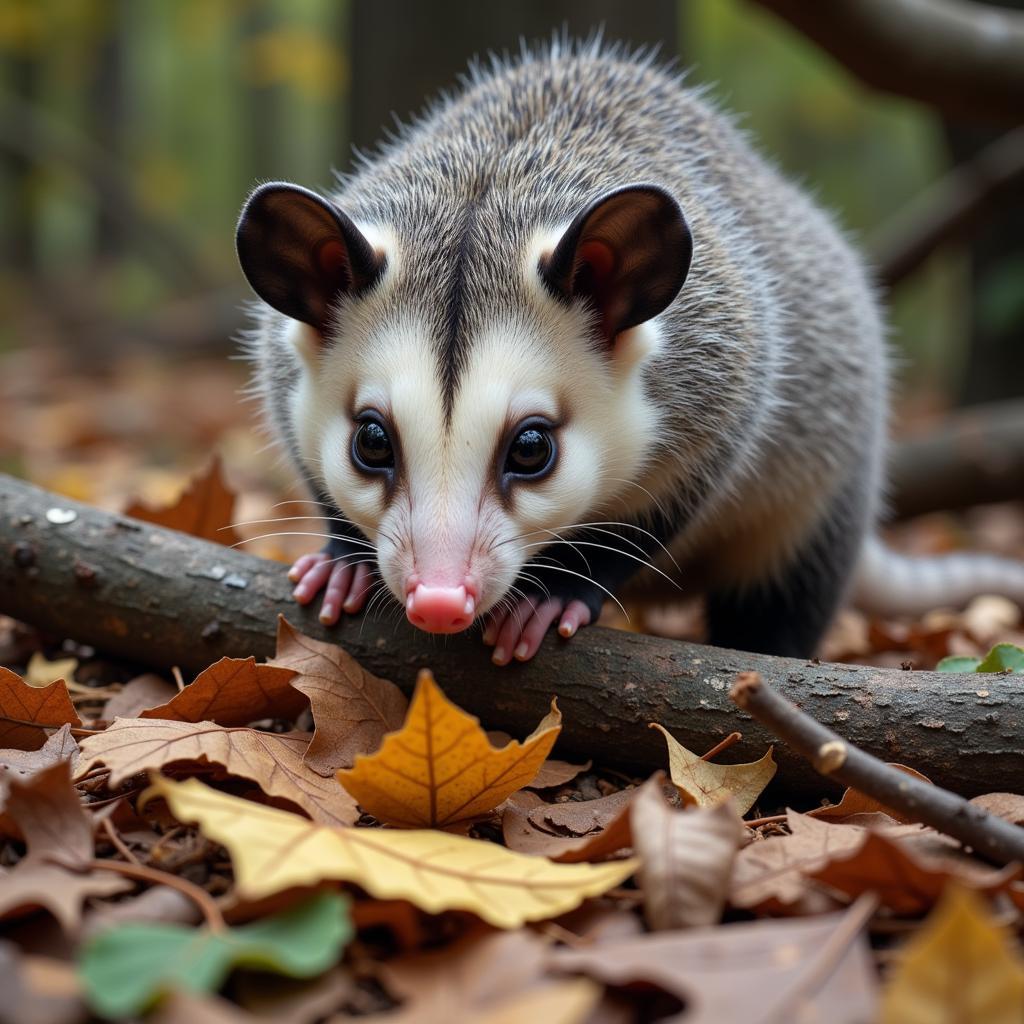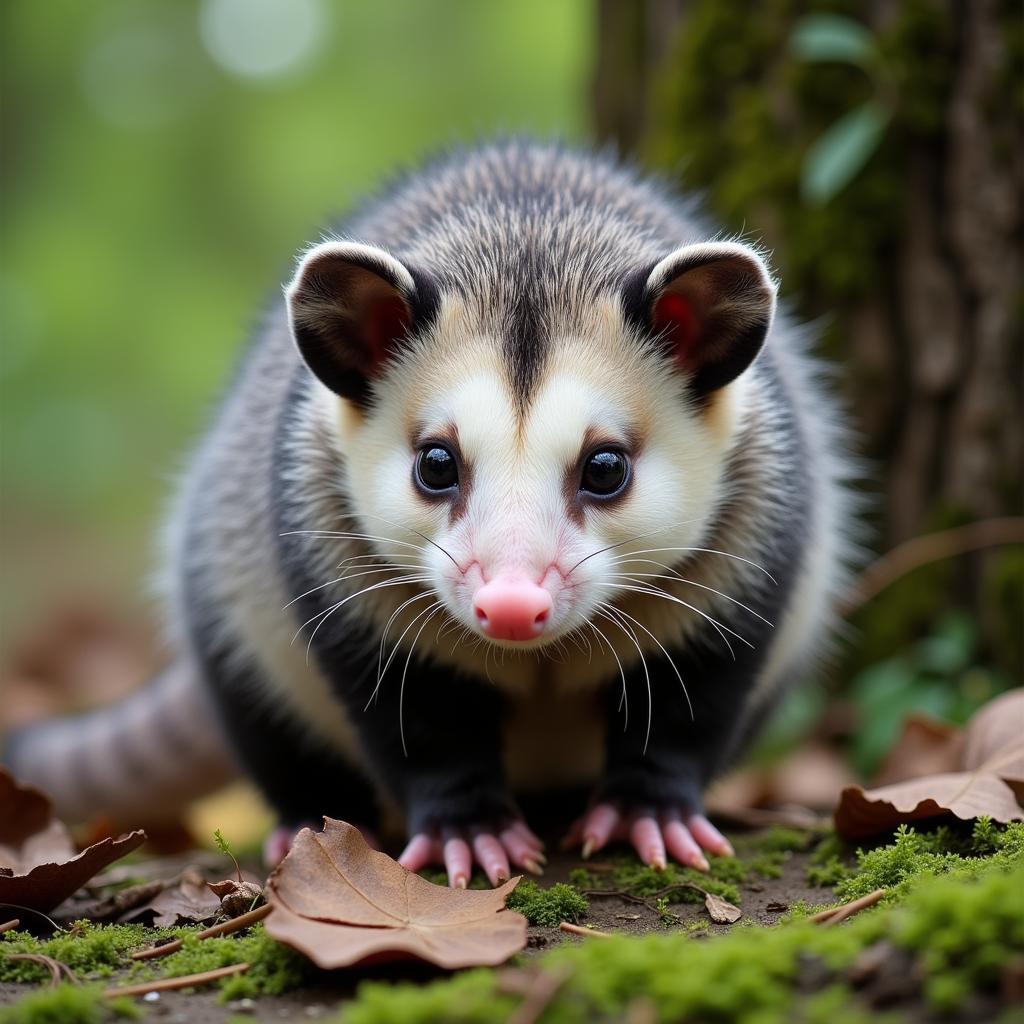Opossum Society, often shrouded in mystery and misconception, is a fascinating realm where adaptation and resilience reign supreme. These often-misunderstood creatures, with their pointed snouts and prehensile tails, have carved out a unique niche for themselves in diverse ecosystems across the Americas. But what is life truly like within an opossum society? Let’s embark on a journey to uncover the secrets of these nocturnal neighbors.
Social Structures: Solitary Wanderers or Communal Dwellers?
Contrary to popular belief, opossums are not inherently social animals. They generally lead solitary lives, interacting primarily for mating purposes. This solitary nature is evident in their home ranges, which rarely overlap except during breeding season. However, this doesn’t mean they lack any social structure.
Female opossums, particularly mothers with young, exhibit a remarkable level of dedication and care. They fiercely protect their offspring, carrying them in their pouches for the first few months of their lives. This maternal bond, while temporary, highlights a crucial aspect of opossum society: the importance of family units.
Communication: A Symphony of Hisses, Clicks, and Growls
While not as vocal as some other mammals, opossums possess a surprisingly diverse repertoire of sounds. Hisses, clicks, growls, and even coughs serve as their primary modes of communication. These auditory cues play a vital role in establishing dominance, attracting mates, and warning off potential threats.
Interestingly, baby opossums, or joeys, communicate with their mothers through a series of high-pitched chirps. These chirps help the mother locate her offspring, especially in the darkness of night. This intricate system of vocalizations underscores the adaptability of opossum society, allowing them to thrive in various environments.
Diet and Foraging: Nature’s Opportunistic Omnivores
Opossums are opportunistic omnivores, meaning their diet consists of both plant and animal matter. This adaptability is key to their survival, enabling them to thrive in a wide range of habitats. From fruits, nuts, and insects to small rodents, carrion, and even garbage, opossums are not picky eaters. Their scavenging habits, often perceived negatively, actually play a crucial role in maintaining ecological balance.
 An opossum foraging for food in the undergrowth.
An opossum foraging for food in the undergrowth.
“Playing Possum”: A Masterclass in Self-Preservation
Perhaps the most iconic aspect of opossum behavior is their famed “playing possum” act. When threatened, these resourceful creatures go limp, drool, and even emit a foul-smelling odor, mimicking the appearance and scent of a deceased animal. This ingenious defense mechanism often deters predators, allowing the opossum to make a swift escape when the coast is clear.
This remarkable adaptation, a testament to their evolutionary success, showcases their resilience and ability to outsmart adversaries.
The Opossum’s Place in Our World: Dispelling Myths, Promoting Coexistence
Opossums, despite their beneficial contributions to our ecosystem, often face negative perceptions. They are wrongly associated with filth, disease, and aggression. It’s crucial to dispel these myths and recognize their importance in maintaining ecological balance.
“Opossums are incredibly beneficial to have around,” states Dr. Emily Carter, a wildlife biologist specializing in urban ecosystems. “They help control rodent populations, consume ticks that can carry Lyme disease, and even contribute to a healthier environment through their scavenging habits.”
 An opossum perched on a branch in its natural habitat
An opossum perched on a branch in its natural habitat
By understanding and appreciating these fascinating creatures, we can foster coexistence and ensure their continued survival. After all, a world with opossums is a world with a healthier, more balanced ecosystem.
FAQs about Opossums
-
Are opossums dangerous?
Opossums are generally not dangerous. They are shy and non-aggressive, preferring to avoid confrontation. -
Do opossums carry rabies?
Opossums have a lower body temperature than most mammals, making them less susceptible to carrying rabies. However, it’s always best to admire them from a distance and avoid direct contact. -
What should I do if I find an injured opossum?
Contact your local wildlife rescue or animal control for assistance.
Need Help? Contact Us!
For further assistance or information regarding opossums or other wildlife concerns, please don’t hesitate to reach out to us. Our dedicated team is available 24/7 to address your queries and provide support. You can contact us via:
- Phone: 02043854663
- Email: [email protected]
- Address: Khu 34, Bac Giang, 260000, Vietnam
Let’s work together to create a world where humans and wildlife coexist harmoniously. Your support can make a difference!